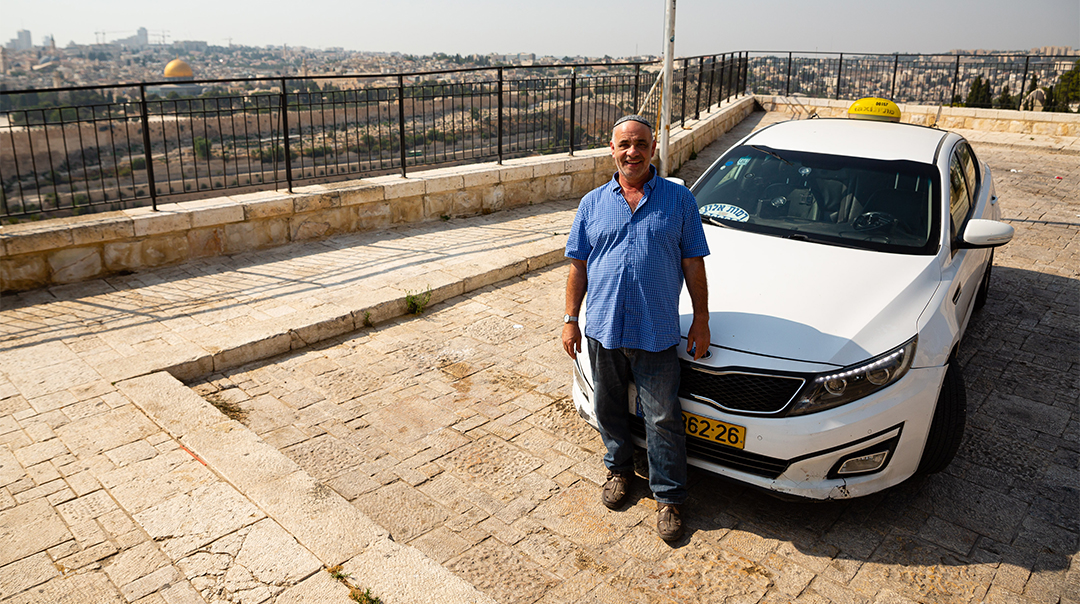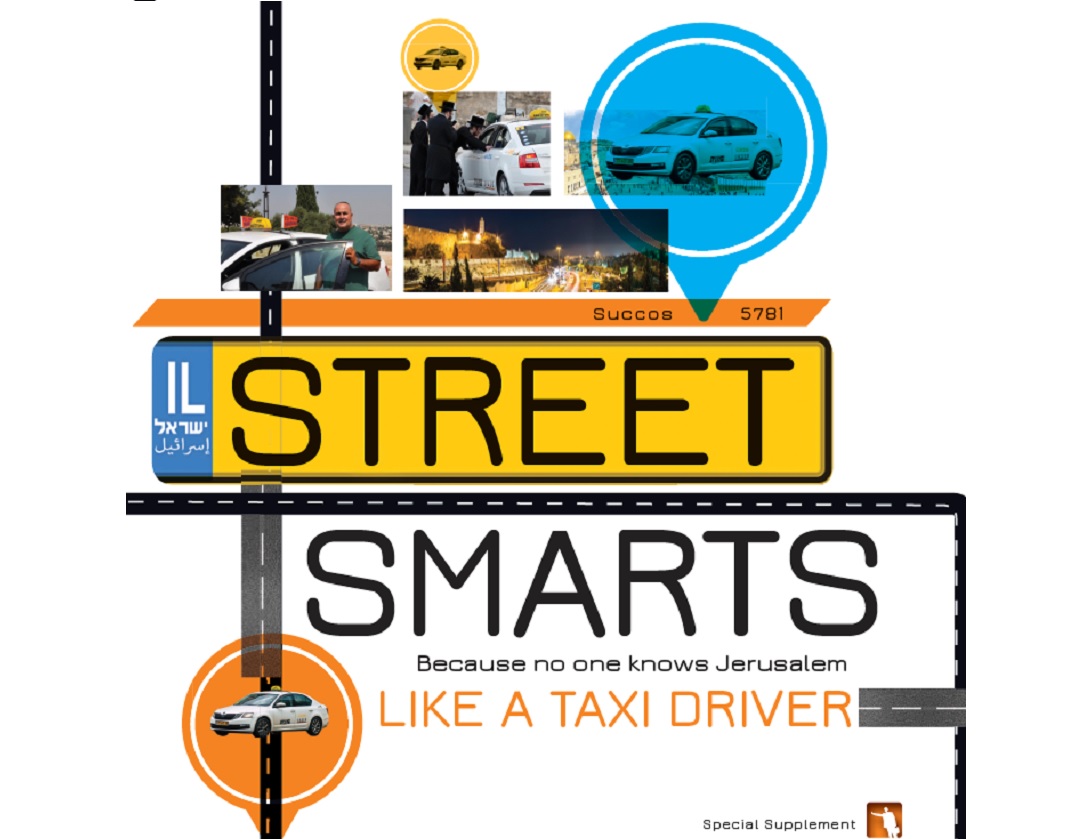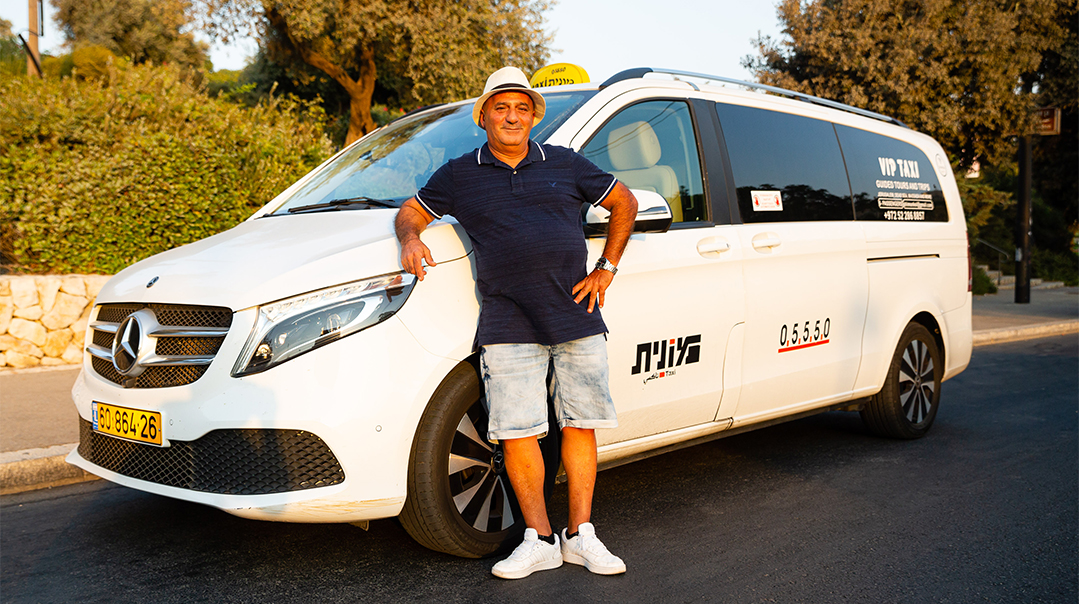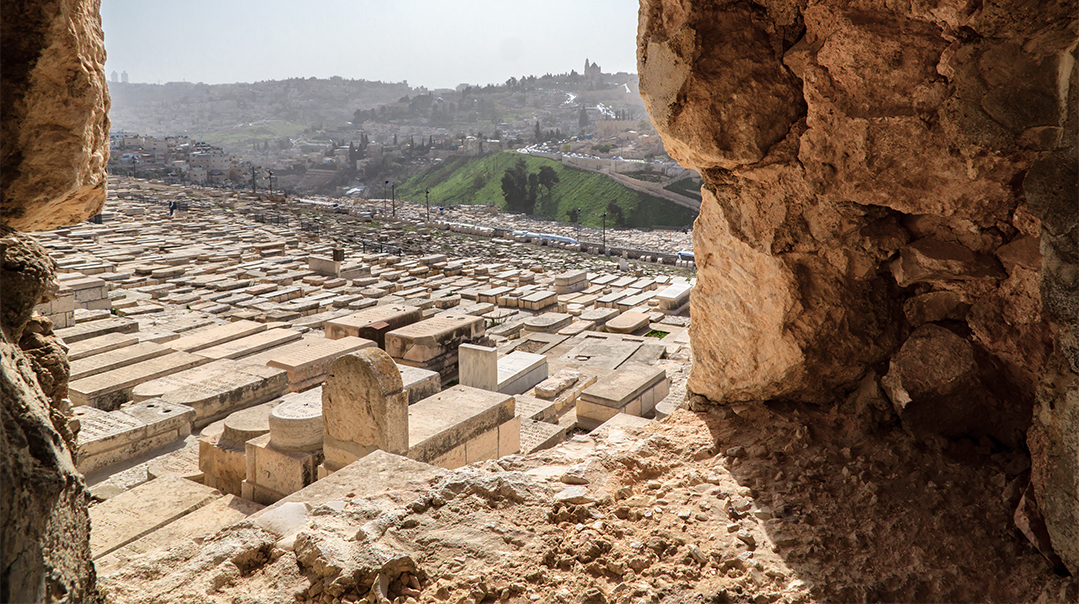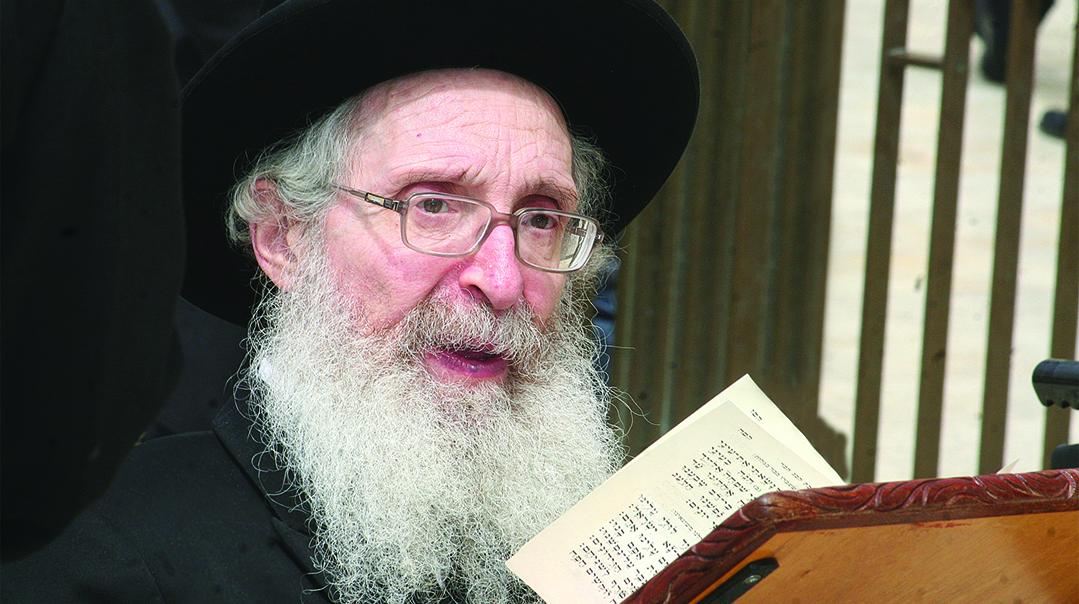Driver’s View

In the taxi world, drivers are divided as to whether a “real” nahag uses Waze. For these veterans who know the city’s every highway and byway, the consensus is clear: real drivers don’t rely on it

W
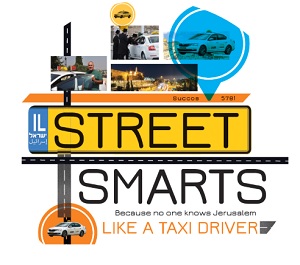
But what’s the view like from the driver’s seat? What’s life like for these drivers who spend the better of the day or night negotiating between narrow streets, busy boulevards, mothers laden with strollers and clinging children, and emotions running the gamut of the human experience?
We took a visit to a popular taxi station and spoke to the drivers between shifts. With humor, honesty, and an unabashed love for their city, these drivers shared their take on what it’s like to man the wheel in a Jerusalem taxi.
Not too many people know every street in Jerusalem like the back of their hand. From the narrow, made-for-donkeys streets of the Old City to the modern Begin Highway to the hilly ascents of Har Nof and breathtaking views of Ramot — which is your favorite driving destination?
Shimshon: Who can pick a single favorite spot? I love the entire city, all of it. As a taxi driver, I have the opportunity to visit so many famous streets and historical sites just in a day’s work. Imagine, all these places I only used to visit once in a while, and now I drive through them on a daily basis!
Morris: The street I enjoy the most is King David street. It just says “Yerushalayim” to me.
Ariel: There’s no destination like the Kotel!
With so many passengers coming in and out of your car every day, you must encounter a huge range of moods and personality types. There are the quiet ones, the ones who ignore you and take out their phones, the ones who focus on their Tehillim, and the ones who want nothing more than a heated conversation about politics. What’s your preference? Do you prefer a chatty client or a silent one?
Yair: Look, this isn’t about me. I’m a service provider, giving my clients the service they’re paying me for. They want to talk, that’s fine. They want to stay quiet, also fine. I try to adapt to the client’s needs.
Ariel: I’m so happy when my clients talk to me. Driving passengers in Jerusalem, I get to listen to lots of chiddushim and divrei Torah. In fact, I enjoy hearing from them so much that many times I start the conversation myself!
Shimshon: I love to listen to my clients. To let them speak, voice their issues and their worries and fears. Technically I’m a driver but in a way, a good taxi driver is also something of a psychologist. Of course I can’t ever know if I really solved a passenger’s problem, but I do get the sense that my advice is well received.
It may have an ancient, noble history, but modern-day Jerusalem is a city filled with children, and its taxis reflect that reality. The Hebrew expression is that children equal happiness — but what happens when you’re the taxi driver and a family laden with Bamba hails your cab? What should a family traveling with kids know before getting in a taxi?
Yair: If you make a mess, don’t hide it. Be honest and tell me the truth. All too often, families will leave the taxi without telling me that the seat needs some cleaning. Anyone can make a mistake and spill something, but the least thing you can do is to inform the driver and apologize.
Shimshon: My rule is no eating in my taxi. If a grown person asks for permission to eat something, I understand. But kids tend to make a mess. I know it’s not their fault, but without that rule I’d have to spend 20 minutes cleaning the Bissli, Bamba, and who-knows-what-else after every cab ride. So if you’re traveling with kids, please don’t bring food along.
Shai: Don’t let the kids play with the doors! A mess can be cleaned up, but shattered lives can’t be fixed.
Ariel: Please seatbelt your children. Baruch Hashem in Jerusalem we drive a lot of chareidim, and while it’s beautiful to see the way they treasure their children, the seatbelt is something they haven’t all incorporated. Please make the effort: it’s for your children’s own safety!
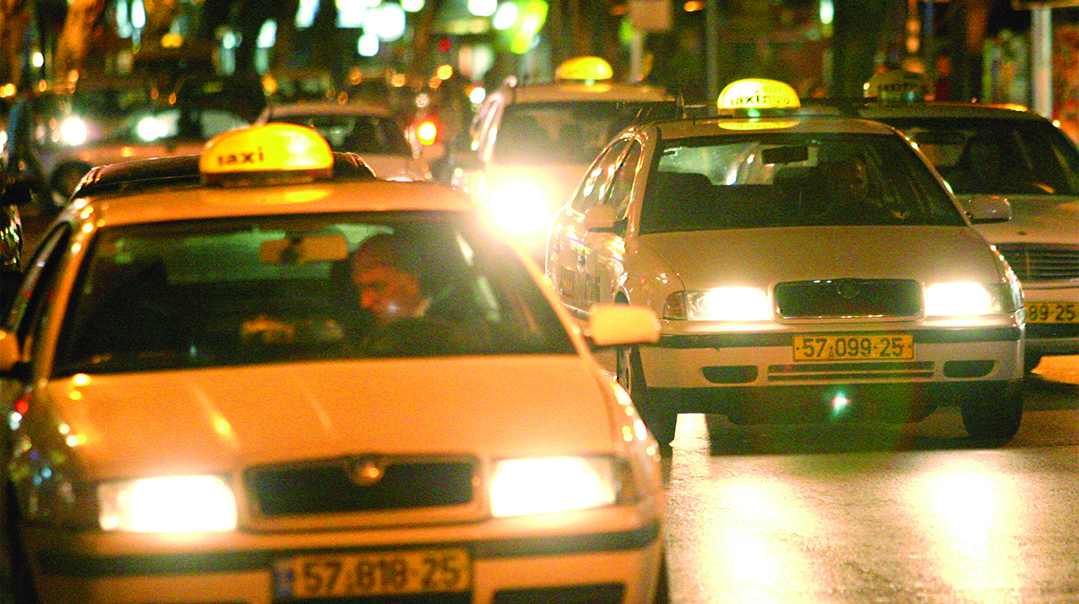
Twenty-four hours a day, from minutes after Havdalah until right before candle-lighting every Friday, there’s always a taxi driver ready for a ride. But even a city like Jerusalem has its quieter and busier times. When is the taxi drivers’ “busy season” of the year?
Yair: Bein Hazmanim. I get literally hundreds of calls a day. And also Succot. Every family has somewhere to go.
Shimshon: Every Erev Chag. Now, because of the COVID situation, things are calmer than in the past, but usually business gets busy starting a couple of days before the chagim.
Morris: Erev Chag is the busiest time of year. Everyone’s shopping, schlepping, running, doing. During the week, the busiest day is Thursday.
Every industry has its markers distinguishing the men from the boys, the professionals from the amateurs. In the taxi world, drivers are divided as to whether a “real” nahag uses Waze. For these veterans who know the city’s every highway and byway, the consensus is clear: real drivers don’t rely on it.
Shimshon: I understand that there are many young guys, newbie drivers who don’t know the streets yet. But an experienced taxi driver shouldn’t use Waze. I’m not saying it’s forbidden to use it — sometimes you really do need it, especially because Jerusalem is constantly building or expanding its neighborhoods. But don’t use it all the time! Knowing the city is part of the job!
Shai: I do use Waze, but not for me — it’s for the customer’s peace of mind. Every single client who gets into a taxi suspects he’s going to get cheated. So when they get in, I usually ask them if they prefer a specific route. If they don’t have any preference, I turn on Waze, so that they can see that I’m not taking advantage and taking a route that will cost them more money.
Working as a taxi driver means welcoming passengers of all stripes and types into your own personal vehicle and space. For however long the ride lasts, the driver has to make it work. But some attitudes and behaviors make it decidedly more challenging. Which attitude makes the ride more difficult?
Shai: The worst thing is an arrogant passenger. You see it, you feel it, you know it as soon as they step in.
Morris: The worst clients are those who think that they are some sort of masters and the taxi driver is their coach driver.
Yair: I’ll do it the other way around: I’ll tell you what I like. I like a passenger who takes into consideration that the driver is a person just like them who’s doing his best to make a living. We’re not robots, we’re not invisible, and we deserve respect just like any other human being. Not only is this approach nicer, it’s also smarter. Because when we get treated as we deserve, then we’re willing to go the extra mile for our clients.
We all hope to come home from a day’s work with only pleasant memories, but sometimes there are unpleasant encounters that leave a lasting impression. What’s an experience you wish you could forget?
Shai: Once I was driving a religious man through the Geula area, and I had to turn into Ezra street, which is very narrow. The area was full of kids riding their bikes, and because the street was so narrow, I couldn’t pass them, so we had to go slow. My passenger thought I was going slow on purpose and started to yell at me, saying I was trying to cheat him. That’s the last thing I’d want someone to think of me.
I showed him the kids, explained the problem — in the end he understood, but I can’t forget that feeling of being accused of cheating. It still makes my skin crawl.
Shimshon: I had a very bad experience once. I picked up an elderly gentleman along with his son and, after we started going, I turned on the taximeter. After a few meters, the son yelled, “When did you start the taximeter?! You turned it on earlier, before we started driving!”
I told him that I turned it on only after we started the ride.
“No!” he argued, “you turned it on before!”
I told him that if he wanted I could restart it; we’d only driven a few meters anyway. He kept on yelling and he said: “I knew it! You’re all thieves!”
Now, when he said that, I stopped the car. I told him that he was accusing me of stealing and I would not tolerate that. I told him to call the office and order a different driver, because I refused to drive him another meter.
So then the father started yelling at his son. “Why are you talking to the driver like this?” he asked. Then he turned to me and said, “Please, I’m sorry for what he said, can you continue driving please?”
I told him I couldn’t do it. His son was accusing me of stealing, and I did not want to take a penny from him, because that money wouldn’t have any brachah. The father begged me to take them. He wouldn’t give up.
Finally I said, “I’ll take you both just for you. If your son would have been alone, I would have left him here.”
Taxis are usually meant for leisurely tourist drives, shopping excursions, visits to relatives, or standard doctor’s visit. Sometimes, in a pinch, they help out in emergencies too. That’s when taxi drivers find their inner ambulance driver and join the chase for help.
Yair: Wow, the emergencies I had! There were so many. Every time it happens, I just try to focus on how lucky I am because, even though I’m just a taxi driver — not a doctor or medic — I still get to help out and serve as a sort of partner in the client’s personal history. I know that when they’ll tell their friends the whole saga they’ll say, “We got into a taxi and…”
Plus, as a Spinka chassid, my Rebbe once told me that in anything I choose to do in his life, I must always prioritize helping another Yid. So when I have to take someone to a hospital fast, I feel I’m fulfilling my Rebbe’s command.
Ariel: Once I had to take a family to the hospital because their kid was having a severe respiratory problem. You can’t imagine how terrifying it is to take a kid who’s grunting and gasping for breath in your car, knowing the parents are relying on you. I drove as fast as I could and, baruch Hashem, we got there on time.
Shimshon: I could write a whole book about my emergency passengers! But I’ll tell you one story. Once a couple from Maalot Dafna called saying they had to get as fast as they could to Hadassah Ein Kerem’s labor and delivery ward. When I got to their house, the woman was in terrible pain. We started the ride and she kept on screaming, and I was sweating like I never did before. We got to the Begin Highway and I realized that there was no way we would make it to the hospital in time, because the speed limit there was 80 kmph. So I called the police and told them, “Listen, I’m on Begin with a passenger who’s about to give birth! I need you to let me drive faster than 80!”
The police took my license plate number and gave me the okay to “get there as fast as you can!” as they put it. So we flew to the hospital and it seems that the police told them we were coming, because there were a few nurses waiting for us with a stretcher. I was terrified, believe me. Even after they got out, I was so tense I couldn’t drive. It took me a while to start breathing normally again.
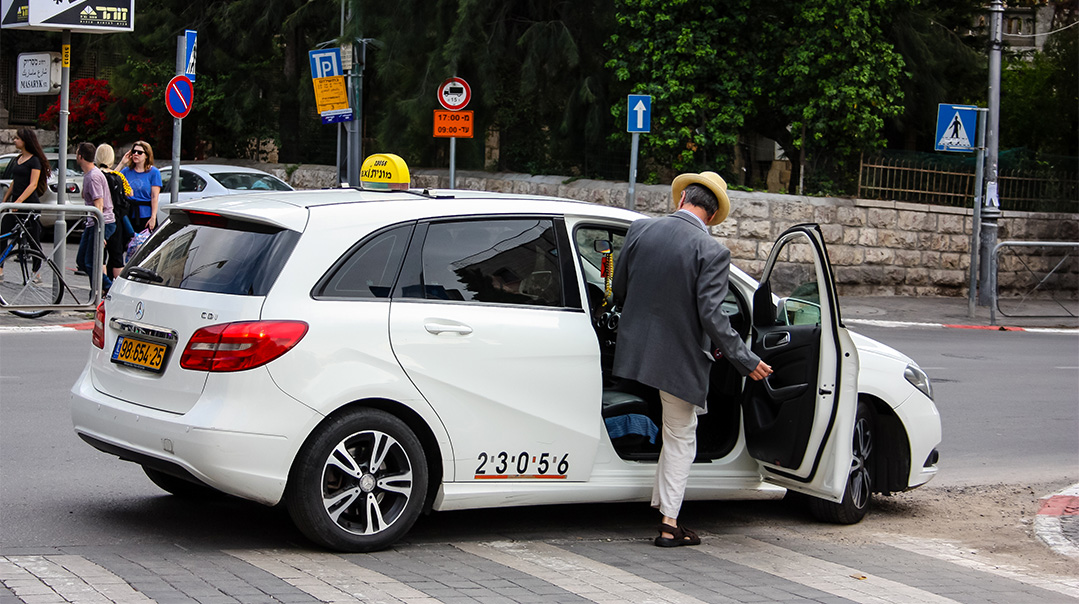
Every tourist who visits Jerusalem loves to show off their Hebrew and schmooze with their driver. What do the drivers make of those efforts? Would they prefer for the tourists to break their teeth but soldier on, or just forget the whole attempt?
Ariel: Personally, I always get a great feeling when they try to speak Hebrew. Even though the accent can be very strong, just the fact that they’re trying is something to respect.
Yair: What I learned over the years is that the language is not so important. Passengers should speak whatever language they feel comfortable with — because what they really expect is comprehension and kindness. I’ve learned that the best language is the nonverbal kind — facial expressions, gestures, making the other person feel comfortable — more than the words themselves.
You’ve Been Warned
Visitors to Israel are constantly warned about dishonest drivers and coached on how to spot or avoid them. Our group of taxi drivers avers that the vast majority of drivers are honest men. But there are ways to detect the exceptions.
The main indicator of a dishonest taxi driver, they say, is the state of his car. You may not be able to judge a book by its cover, but you can just a driver by the way he keeps his vehicle. If the driver is unkempt, dirty, and doesn’t seem to show any concern or car about the interior of his car, keep your eyes open.
“Our car is our office,” one of the drivers put it. “A passenger spends just 15 minutes inside, but we’ll spend more than eight straight hours inside. Just like our service is based on being helpful and solicitous of the clients, it’s based on giving them a pleasant environment. If a driver who doesn’t care about his car, it’s because he doesn’t care about the service and the client.”
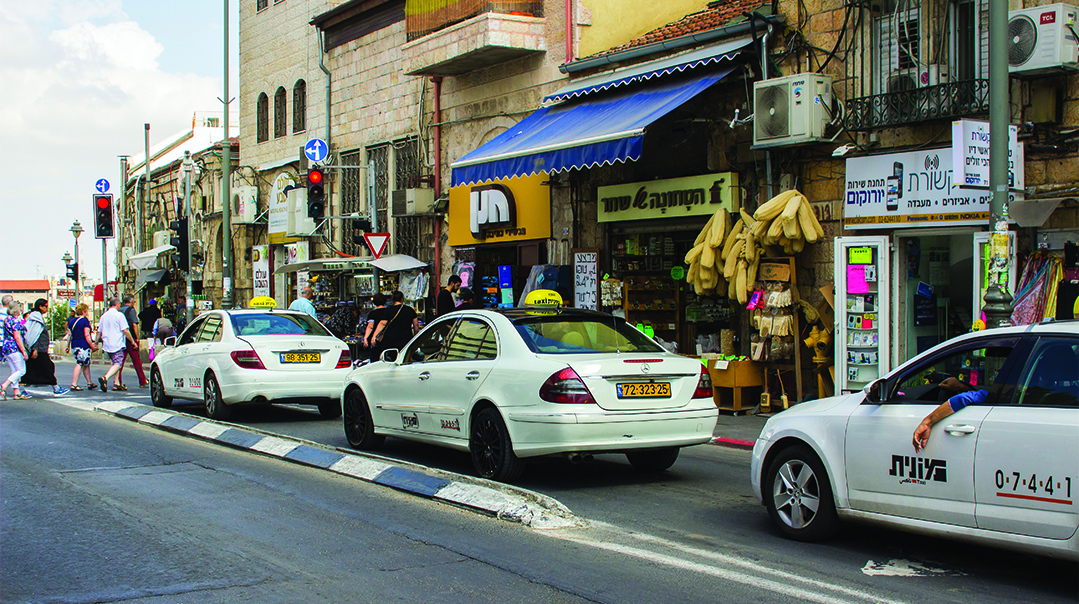
Follow the Leader
Many of the taxi drivers we spoke to have merited to count among their clients gedolei Yisrael.
Yair Reshevsky told Mishpacha that during the course of his years behind the wheel, he’s driven admorim and roshei yeshivos like the Ponevezh Rosh Yeshivah, the Chernobyl Rebbe, and the Spinka Rebbe. “It’s not that they call me personally,” he’s quick to clarify. “Usually it’s someone from their inner circle who will have my number. So I get a call, I show up, and then before I know it there’s a gadol in my car!”
Shai told us that he used to be the steady driver of Rav Yaakov Yosef ztz”l when the rav delivered a weekly shiur in Gilo. “Every time I drive through those streets, I remember him,” he says.
But one of the most interesting stories was told by Shimshon Shmuel. One Motzaei Shabbos he was flagged by someone who seemed to be a typical avreich. But as the “typical avreich” settled into his taxi, a stream of people followed him, asking for brachos from him, kissing his hand, begging for yeshuos… Finally the man closed the door and Shimshon began to drive. When their reached their destination, the same scene repeated itself. Clearly, this was no standard client.
Shimshon didn’t know who this person was, but he knew he had driven someone special. Then a man told him: “Do you know who was just sitting in your car? It was the famous mekubal Rav David Batzri!”
“I took the money that he had paid me,” Shimshom said, “and put it aside. I’ve never used it since — I keep it as a sort of segulah.”
(Originally featured in Mishpacha, Issue 830)
Oops! We could not locate your form.

